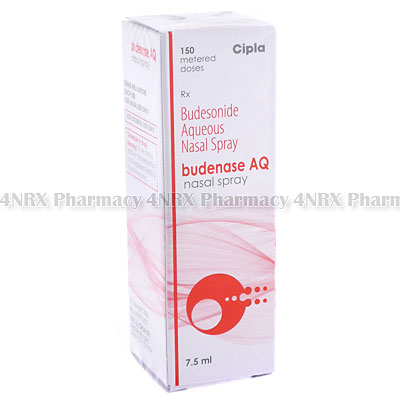 |
Home  Allergies Allergies  Budenase AQ Nasal Spray (Budesonide) Budenase AQ Nasal Spray (Budesonide) |
|
|||||||||
|
Budenase AQ Nasal Spray (Budesonide)
What is Budenase AQ Nasal Spray (Budesonide) used for? Budenase AQ Nasal Spray (Budesonide) is used to treat nasal symptoms of allergies such as congestion, sneezing and rhinitis. This drug can also be used to prevent nasal polyps from returning after they have been surgically removed. It works by helping to prevent the release into the body of certain substances that cause inflammation to occur. How should I use Budenase AQ Nasal Spray (Budesonide)? Budenase AQ Nasal Spray (Budesonide) should be sprayed directly into the nostril. Patients should blow their nose gently before use. The nozzle should then be inserted into the nostril, and the spray administered. The patient should inhale through the nose and exhale through the mouth. The exact dosage varies, depending on the severity of the condition being treated. Patients are usually directed to administer 1 to 4 sprays into each nostril once per day. Consult your physician before using this medication so that the correct amount can be prescribed to you. What are the side effects of Budenase AQ Nasal Spray (Budesonide)? Some side effects which have been reported by patients taking Budenase AQ Nasal Spray (Budesonide) include:
Consult your physician immediately if any of these side effects persist or worsen, or if you notice severe nose bleeds, sores in the nose that don't heal, breathlessness, wheezing, changes in vision or fever. Please Note Strictly follow all instructions provided to you by your physician or pharmacist while using Budenase AQ Nasal Spray (Budesonide). Optimum and safe dosage can differ based on the patient and the condition being treated. As this medication may be unsafe for certain patients, it is essential you always inform your physician if you are pregnant or breastfeeding, as well as if you have any allergies, other illnesses, or ongoing health conditions, and if you are taking any other form of medication, supplements, or herbal products. Immediately seek emergency medical care if you have any allergic or hypersensitive reaction. Common signs of a reaction include hives, swelling, skin rashes, chest pains, as well as trouble breathing or swallowing. 
|
|||||||||||||||||